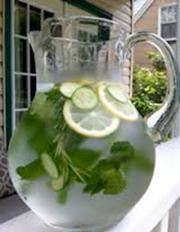Artificial sweeteners in beverages: Part 2
Artificial sweeteners may contribute to weight management is used in moderation.
Millions of people consume diet soda or diet drink choices on a daily basis. Most choose diet beverages to try and cut the extra sugar calories in regular sodas. Recently there has been a lot of discussion about whether diet beverages are a positive or not.
choices on a daily basis. Most choose diet beverages to try and cut the extra sugar calories in regular sodas. Recently there has been a lot of discussion about whether diet beverages are a positive or not.
Regular soda, juice or sports drinks often contain upwards of 100 or more calories per serving, largely from sugar; and sugar has been blamed for a variety of illnesses, from obesity to diabetes to dental cavities. Excess calories, of course, contribute to weight gain if off balance with the calories that we burn each day. The number one source of sugar in the United States is soda, followed by sweets such as candy, cake, cookies, etc.
Diet beverages, on the other hand, generally contain a low calorie or “artificial” sweetener in place of sugar, so the calorie content is significantly reduced. Recently, some have suggested that artificial sweeteners in soda don’t actually help and could even hinder weight management. Based on studies, this view is largely based on animal studies, and the majority of research in humans supports that low calorie sweeteners either have a neutral effect or provide a modest benefit to those trying to keep a healthy weight.
So how do you know if a product contains sugar or a low calorie sweetener? Read the food label ingredient list. Words such as: Corn syrup, dextrose, fructose, molasses, fruit-juice concentrate, glucose, high-fructose corn syrup (HFCS), honey, invert sugar, lactose, syrup, sucrose, raw sugar, maple syrup or maltose may identify a sugar source. Alternative sweeteners can be identified on the food label ingredient list as: Nectresse, aspartame, acesulfame K, saccharin, steviol glycosides, sucralose and neotame.
The American Heart Association reviewed evidence suggests that when not used excessively, low calorie sweeteners can facilitate reductions in added sugar intake, thereby resulting in decreased total energy and weight loss/weight control, with the associated health benefits. However, these potential benefits will not be fully realized unless the total calories in the diet are kept in check.
Again it is important to emphasize that moderation is key to consuming sugar or sweetener containing beverages. Focusing on increasing water consumption aligns with the 2010 Dietary Guidelines for Americans. Water may be a good alternative and diet beverages can be a reasonable choice – as long as you don’t use that diet soda as an excuse for a piece of chocolate pie for dessert!
Michigan State University Extension offers nutrition education classes for adults that discuss choosing healthy options from each food group, shopping on a budget, as well as basic nutrition information. For more information visit the Eating Right is Basic page. For more on this topic read Artificial sweeteners – just as bad for you?



 Print
Print Email
Email


